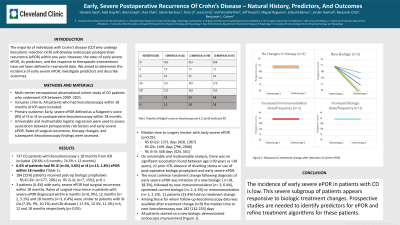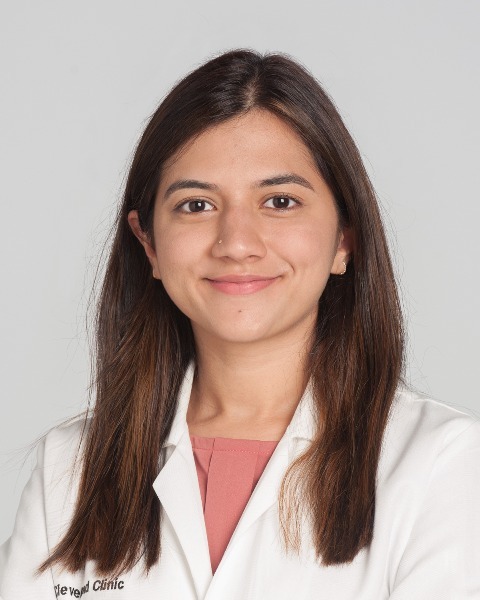Monday Poster Session
Category: IBD
P2196 - Early, Severe Postoperative Recurrence of Crohn’s Disease – Natural History, Predictors, and Outcomes
Monday, October 23, 2023
10:30 AM - 4:15 PM PT
Location: Exhibit Hall


Hareem Syed, MD
Cleveland Clinic
Cleveland, OH
Presenting Author(s)
Hareem Syed, MD1, Adel Hajj Ali, MD1, Abel Joseph, MD1, Ravi S. Shah, MD1, Salam Bachour, MD, MS2, Terry Li, MD3, Jessica H. Hu, BS4, Vall Vinaithirthan, MD5, Jeffrey D. Kovach, BS, MS1, Miguel Regueiro, MD6, Edward Barnes, MD, MPH, FACG7, Jordan Axelrad, MD, MPH8, Benjamin Click, MD9, Ben Cohen, MD, MAS1
1Cleveland Clinic, Cleveland, OH; 2Brigham and Women's Hospital, Harvard Medical School, Boston, MA; 3NYU Langone, New York, NY; 4UNC School of Medicine, Chapel Hill, NC; 5University of Colorado, South Burlington, VT; 6Cleveland Clinic Lerner College of Medicine, Case Western Reserve University, Cleveland, OH; 7University of North Carolina at Chapel Hill, Chapel Hill, NC; 8NYU Grossman School of Medicine, New York, NY; 9University of Colorado, Denver, CO
Introduction: Majority of individuals with Crohn's disease (CD) who undergo ileocolonic resection (ICR) will develop endoscopic postoperative recurrence (ePOR) within one year. However, the rates of early severe ePOR , its predictors, and the response to therapeutic interventions have not been defined in real-world data.
Methods: We performed a multi-center retrospective observational cohort study of CD patients who underwent ICR between 2009-2021. Patients who had ileocolonoscopy within 18 months of ICR were included. The primary outcome of the study was early, severe ePOR defined as a Rutgeerts score (RS) of i3 or i4 on postoperative ileocolonoscopy within 18 months. Association between perioperative risk factors and early severe ePOR was evaluated. Rates of surgical recurrence, therapy changes, and subsequent ileocolonoscopy findings were assessed.
Results: 737 patients with CD who had an ileocolonoscopy within 18 months of their index ICR were identified. Overall, 6.4% of patients had RS i3 (n=34, 4.6%) or i4 (n=13, 1.8%) ePOR within 18 months (Table 1). On univariable and multivariable analysis, there was no significant association found between severe ePOR and age (< 30 years vs > 30 years), history of ≥2 prior ICR, absence of diverting stoma or use of post-operative biologic prophylaxis. Rates of surgical recurrence in patients with severe ePOR diagnosed within 6 months (0%), 12 months (5.1%) and 18 months (6.4%) were similar to patients with i0-i2a and i2b disease in their respective time periods (p > 0.05 ). The median time to surgery in patients with severe ePOR within 18 months (458 [424,561] days) was much shorter than patients with i0-i2a (1371 [420, 1967] days) and i2b (1491 [796,2006] days). The most common treatment change following diagnosis of early severe ePOR was initiation of a new biologic (38.3%), followed by new immunomodulator (6.4%), optimized current biologic (4.3%) or immunomodulator (2.1%). Among those for whom follow-up ileocolonoscopy data was available after treatment change (n=9) the median time to next ileocolonoscopy was 182 [132-233] days and all patients started on a new biologic had endoscopic improvement (Figure 1).
Discussion: The incidence of early severe ePOR in patients with CD is low. This severe subgroup of patients appears responsive to biologic treatment changes. Prospective studies are needed to identify predictors for ePOR and refine treatment algorithms for these patients.

Disclosures:
Hareem Syed, MD1, Adel Hajj Ali, MD1, Abel Joseph, MD1, Ravi S. Shah, MD1, Salam Bachour, MD, MS2, Terry Li, MD3, Jessica H. Hu, BS4, Vall Vinaithirthan, MD5, Jeffrey D. Kovach, BS, MS1, Miguel Regueiro, MD6, Edward Barnes, MD, MPH, FACG7, Jordan Axelrad, MD, MPH8, Benjamin Click, MD9, Ben Cohen, MD, MAS1. P2196 - Early, Severe Postoperative Recurrence of Crohn’s Disease – Natural History, Predictors, and Outcomes, ACG 2023 Annual Scientific Meeting Abstracts. Vancouver, BC, Canada: American College of Gastroenterology.
1Cleveland Clinic, Cleveland, OH; 2Brigham and Women's Hospital, Harvard Medical School, Boston, MA; 3NYU Langone, New York, NY; 4UNC School of Medicine, Chapel Hill, NC; 5University of Colorado, South Burlington, VT; 6Cleveland Clinic Lerner College of Medicine, Case Western Reserve University, Cleveland, OH; 7University of North Carolina at Chapel Hill, Chapel Hill, NC; 8NYU Grossman School of Medicine, New York, NY; 9University of Colorado, Denver, CO
Introduction: Majority of individuals with Crohn's disease (CD) who undergo ileocolonic resection (ICR) will develop endoscopic postoperative recurrence (ePOR) within one year. However, the rates of early severe ePOR , its predictors, and the response to therapeutic interventions have not been defined in real-world data.
Methods: We performed a multi-center retrospective observational cohort study of CD patients who underwent ICR between 2009-2021. Patients who had ileocolonoscopy within 18 months of ICR were included. The primary outcome of the study was early, severe ePOR defined as a Rutgeerts score (RS) of i3 or i4 on postoperative ileocolonoscopy within 18 months. Association between perioperative risk factors and early severe ePOR was evaluated. Rates of surgical recurrence, therapy changes, and subsequent ileocolonoscopy findings were assessed.
Results: 737 patients with CD who had an ileocolonoscopy within 18 months of their index ICR were identified. Overall, 6.4% of patients had RS i3 (n=34, 4.6%) or i4 (n=13, 1.8%) ePOR within 18 months (Table 1). On univariable and multivariable analysis, there was no significant association found between severe ePOR and age (< 30 years vs > 30 years), history of ≥2 prior ICR, absence of diverting stoma or use of post-operative biologic prophylaxis. Rates of surgical recurrence in patients with severe ePOR diagnosed within 6 months (0%), 12 months (5.1%) and 18 months (6.4%) were similar to patients with i0-i2a and i2b disease in their respective time periods (p > 0.05 ). The median time to surgery in patients with severe ePOR within 18 months (458 [424,561] days) was much shorter than patients with i0-i2a (1371 [420, 1967] days) and i2b (1491 [796,2006] days). The most common treatment change following diagnosis of early severe ePOR was initiation of a new biologic (38.3%), followed by new immunomodulator (6.4%), optimized current biologic (4.3%) or immunomodulator (2.1%). Among those for whom follow-up ileocolonoscopy data was available after treatment change (n=9) the median time to next ileocolonoscopy was 182 [132-233] days and all patients started on a new biologic had endoscopic improvement (Figure 1).
Discussion: The incidence of early severe ePOR in patients with CD is low. This severe subgroup of patients appears responsive to biologic treatment changes. Prospective studies are needed to identify predictors for ePOR and refine treatment algorithms for these patients.

Figure: Figure 1: Response to treatment change after detection of severe ePOR
Disclosures:
Hareem Syed indicated no relevant financial relationships.
Adel Hajj Ali indicated no relevant financial relationships.
Abel Joseph indicated no relevant financial relationships.
Ravi Shah indicated no relevant financial relationships.
Salam Bachour indicated no relevant financial relationships.
Terry Li indicated no relevant financial relationships.
Jessica Hu indicated no relevant financial relationships.
Vall Vinaithirthan indicated no relevant financial relationships.
Jeffrey Kovach indicated no relevant financial relationships.
Miguel Regueiro: AbbVie – Advisory Committee/Board Member, Consultant, Unrestricted educational grants. Alfasigma – Advisory Committee/Board Member, Consultant. Allergan – Advisory Committee/Board Member, Consultant. Amgen – Advisory Committee/Board Member, Consultant. Bristol Myers Squibb – Advisory Committee/Board Member, Consultant, Unrestricted educational grants. Celgene – Advisory Committee/Board Member, Consultant, Unrestricted educational grants. Eli Lilly – Advisory Committee/Board Member, Consultant. Genentech – Advisory Committee/Board Member, Consultant, Unrestricted educational grants. Gilead Sciences – Advisory Committee/Board Member, Consultant, Unrestricted educational grants. Janssen – Advisory Committee/Board Member, Consultant, Unrestricted educational grants. Miraca Labs – Advisory Committee/Board Member, Consultant. Pfizer Inc – Advisory Committee/Board Member, Consultant, Unrestricted educational grants. Prometheus – Advisory Committee/Board Member, Consultant. Salix – Advisory Committee/Board Member, Consultant. Seres – Advisory Committee/Board Member, Consultant. Takeda – Advisory Committee/Board Member, Consultant, Unrestricted educational grants. Target RWE – Advisory Committee/Board Member, Consultant. UCB – Advisory Committee/Board Member, Consultant, Unrestricted educational grants. Wolters Kluwer Health – Royalties.
Edward Barnes: AbbVie, Inc. – Consultant. Bristol-Meyers Squibb – Consultant. Eli Lilly – Consultant. Target RWE – Consultant.
Jordan Axelrad: AbbVie – received consulting fees. Adiso – received consulting fees. BioFire Diagnostics – Consultant, Grant/Research Support. Bristol Myers Squibb – received consulting fees. Fresenius Kabi – received consulting fees. Janssen – received consulting fees. Pfizer – received consulting fees.
Benjamin Click: AbbVie – Consultant. Bristol Meyers Squibb – Consultant. Janssen – Advisory Committee/Board Member, Consultant. Pfizer – Advisory Committee/Board Member, Consultant. Prometheus – Consultant. Takeda – Advisory Committee/Board Member.
Ben Cohen indicated no relevant financial relationships.
Hareem Syed, MD1, Adel Hajj Ali, MD1, Abel Joseph, MD1, Ravi S. Shah, MD1, Salam Bachour, MD, MS2, Terry Li, MD3, Jessica H. Hu, BS4, Vall Vinaithirthan, MD5, Jeffrey D. Kovach, BS, MS1, Miguel Regueiro, MD6, Edward Barnes, MD, MPH, FACG7, Jordan Axelrad, MD, MPH8, Benjamin Click, MD9, Ben Cohen, MD, MAS1. P2196 - Early, Severe Postoperative Recurrence of Crohn’s Disease – Natural History, Predictors, and Outcomes, ACG 2023 Annual Scientific Meeting Abstracts. Vancouver, BC, Canada: American College of Gastroenterology.
